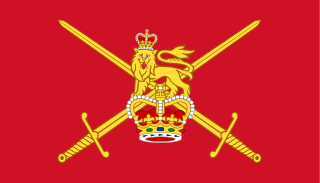
A Generaloberst was the second-highest general officer rank in the German Reichswehr and Wehrmacht, the Austro-Hungarian Common Army, the East German National People's Army and in their respective police services. The rank was equal to a four-star full general but below a general field marshal. The rank was equivalent to a Generaladmiral in the Kriegsmarine until 1945 or to a Flottenadmiral in the Volksmarine until 1990. It was the highest ordinary military rank and the highest military rank awarded in peacetime; the higher rank of general field marshal was awarded only in wartime by the head of state. In general, a Generaloberst had the same privileges as a general field marshal.

Major General John Keatly Forsyth, was a senior Australian Army officer in the First World War and after.

Major General Sir John Gellibrand, was a senior Australian Army officer in the First World War, Chief Commissioner of the Victoria Police from 1920 to 1922, and a member of the Australian House of Representatives, representing the Tasmanian Division of Denison for the Nationalist Party from 1925 to 1928.
George Stuart Gordon was a British literary scholar.

The Quartermaster-General to the Forces (QMG) is a senior general in the British Army. The post has become symbolic: the Ministry of Defence organisation charts since 2011 have not used the term "Quartermaster-General to the Forces"; they simply refer to "Chief of Materiel (Land)".
Major General George Lammie CBE MC was an officer in the British Army during World War II.
Major-General Sir Theodore Fraser, was a British soldier of the Royal Engineers, serving for most of his career with the Indian Army.

Lieutenant General Henry Douglas Wynter, was an Australian Army officer who rose to the rank of lieutenant general during the Second World War. Official Historian Gavin Long described him as "perhaps the clearest and most profound thinker the Australian Army of his generation had produced."
Brigadier-General William Harry Verelst Darell CMG, DSO was a British Army officer and rower who won the Diamond Challenge Sculls at Henley Royal Regatta.

Lieutenant General Sir William Bridgeford, was a senior officer in the Australian Army. He began his military career in 1913 and fought on the Western Front during the First World War, before rising to command the 3rd Infantry Division during the Bougainville campaign in the Second World War. Later he served as the Commander in Chief of British Commonwealth Forces Korea during the Korean War. He retired from the military in 1953 and worked on the organising committee of the 1956 Melbourne Olympic Games, as well as being the director of several companies and treasurer of a returned services organisation.

Lieutenant-General Sir Gordon Nevil Macready, 2nd Baronet was a British Army officer who served as Assistant Chief of the Imperial General Staff during the Second World War.
Lieutenant General Thomas William Corbett, was a British Indian Army officer who commanded the IV Corps during the Second World War.

General Sir Arthur Brodie Haig, KCB, MC and bar was a British officer in the Indian Army. A pre-war regular officer he served in India prior to the outbreak of the First World War when he was posted to the Middle East. He was wounded at the Battle of Shaiba, twice mentioned in dispatches and awarded the Military Cross (MC) before he was taken prisoner by the Ottoman Empire at the Siege of Kut. Escaping captivity in August 1918 he received a bar to his MC.

Major General Philip Sidney Whitcombe was an English cricketer active from 1922 to 1931 who played for Essex and in India. He was born in Windsor, Berkshire, and died in Hindhead, Surrey. He appeared in four first-class matches as a righthanded batsman who bowled right arm fast medium pace. He scored 81 runs with a highest score of 32* and took no wickets.

Colin Macdonald Gilray was a Scottish-born rugby union player, soldier and educationalist. He represented both New Zealand and Scotland in rugby union and won the Military Cross during World War I as a captain in the British Rifle Brigade. A Rhodes Scholar, he became headmaster of both John McGlashan College in Dunedin, New Zealand, and Scotch College, Melbourne, and served as deputy chancellor of the University of Melbourne on two separate occasions.
The England–Scotland Professional Match was an annual men's professional golf competition between teams representing England and Scotland. It was played from 1903 to the start of World War I and was then revived in 1932 and played until the start of World War II. The match was played on a single day, generally a few days before the Open Championship. Except on one occasion, there were 12 players in each team who played 12 singles matches and 6 foursomes. Scotland won the inaugural match in 1903 but didn't win another match, although three matches were tied. The event was organised by the PGA and only members of the PGA were eligible to play.
The England–Scotland Amateur Match was an annual men's amateur golf competition between teams representing England and Scotland. It was played from 1902 to 1931, although the match lapsed between 1913 and 1921. The match continued after 1931 but as part of the Men's Home Internationals in which Ireland and Wales also competed. Until 1931 it was played in connection with the Amateur Championship, on the Saturday either before or after the championship.

Julius A. Penn was a career officer in the United States Army. He attained the rank of brigadier general during World War I, and commanded 170th Infantry Brigade, 85th Division and 76th Infantry Brigade, 38th Division, in addition to serving as Chief of the Personnel Bureau for the American Expeditionary Forces.
Brigadier-General Alfred James Whitacre Allen was a British Army officer.










